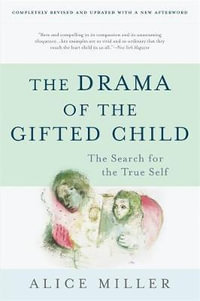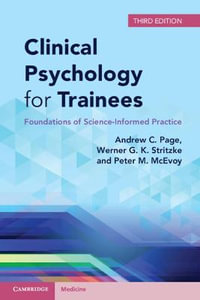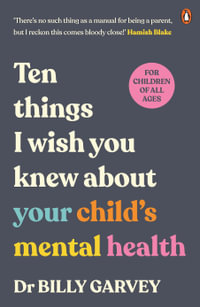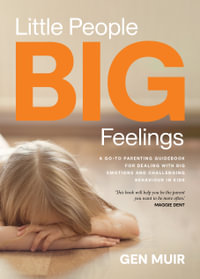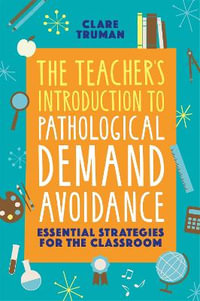
Instant online reading.
Don't wait for delivery!
Go digital and save!
Human Birth
An Evolutionary Perspective
Hardcover | 31 December 1987
At a Glance
286 Pages
22.9 x 15.2 x 2.54
Hardcover
RRP $284.00
$200.95
29%OFF
or 4 interest-free payments of $50.24 with
orAims to ship in 7 to 10 business days
The story of human evolution has been told hundreds of times, each time with a focus that seems most informative of the teller. No matter how it is told the primary characters are rarely mothers and infants. Darwin argued survival, but today we know that reproduction is what evolution is all about. Centering on this, Trevathan focuses on birth, which gives the study of human evolution a crucial new dimension.
Unique among mammals, humans are bipedal. The evolution of bipedalism required fundamental changes in the pelvis and resulted in a narrow birth canal. Humans are also large-brained animals, which means that birth is much more challenging for our species than for most other animals. The result of this mismatch of large head and narrow pelvis is that women are highly dependent on assistance at birth and their babies are born in an unusually undeveloped state when the brain is still small. Human Birth discusses how the birth process has evolved and ways in which human birth differs from birth in all other mammals.
Human Birth is also concerned with mother-infant interaction immediately after birth. While working as a midwife trainee, Trevathan carefully documented the births of more than one hundred women and recorded maternal and infant behaviors during the first hour after birth. She suggests ways in which the interactions served not only to enhance mother-infant bonding, but also to ensure survival in the evolutionary past. With clarity and compelling logic Trevathan argues that modern birth practices often fail to meet evolved needs of women and infants and suggests changes that could lead to better birth experiences. This paperback edition includes a new introduction by the author.
Industry Reviews
--Joan B. Silk, American Scientist
-Trevathan weaves together diverse information ranging from physiochemical constraints on reproductive physiology to cross-cultural studies of contemporary maternal behavior, constructing a coherent image of the perinatal period throughout hominid history... The breadth of information on primate reproductive biology brought to bear in this book is impressive and should make the volume interesting to scientists from many disciplines.-
--Debra S. Judge, The Quarterly Review of Biology
-Human Birth is a highly readable and scholarly integrative overview of anthropological understandings of human birth... Trevathan has not only written a state-of-the-science book on human birth and mother-infant bonding from an anthropological perspective, but she has also provided an integrated, biosocial perspective of the evolutionary history of human birth and its meaning in today's world.-
--Jane B. Lancaster, American Anthropologist
-Human Birth is an eminently sensible book. I mean this as high praise. It is not easy to be sensible about a process that is so strongly both biological and cultural... This book is a scholarly study which combines primate background, fossil evidence, and ethological observations of human behavior. It is a welcome contribution to anthropological literature, written for an audience of specialists. However, the implications of the work are broader, and apply to medical practice and the approaches of mothers to childbirth.-
--Alison Jolly, Medical Anthropology Quarterly
-This book is concerned with birthing, bonding, and the role of both within an evolutionary context... [I]n an age when one in four births is cesarean delivery, when in vitro fertilization, transferred and frozen embryos, surrogate tugs-of-war, prenatal fetal therapy, and other technological but sometimes dubious marvels continue to be advanced, a book that is not an analysis of the moral and ethical implications of biotechnology, but has as its theme noninterventionist birth, is a novelty and worth reading.-
--Ethel Sloane, Gender and Society
-The book is interestingly written... [T]he author has struck out boldly to provide an accounting of the putative role of birth and human evolution and provides several hypotheses for future research to address.-
--Doris R. Entwisle, Journal of Marriage and Family "Trevathan carefully details the extraordinary series of challenges that mothers and their infants face during the nine months of pregnancy, the critical and arduous hours of labor and delivery, and the long period during which the infant develops into an independent individual... The special strength of this book is that Trevathan not only describes the human birth process, but also speculates about the evolutionary mechanisms that have shaped these complex adaptations over time."
--Joan B. Silk, American Scientist
"Trevathan weaves together diverse information ranging from physiochemical constraints on reproductive physiology to cross-cultural studies of contemporary maternal behavior, constructing a coherent image of the perinatal period throughout hominid history... The breadth of information on primate reproductive biology brought to bear in this book is impressive and should make the volume interesting to scientists from many disciplines."
--Debra S. Judge, The Quarterly Review of Biology
"Human Birth is a highly readable and scholarly integrative overview of anthropological understandings of human birth... Trevathan has not only written a state-of-the-science book on human birth and mother-infant bonding from an anthropological perspective, but she has also provided an integrated, biosocial perspective of the evolutionary history of human birth and its meaning in today's world."
--Jane B. Lancaster, American Anthropologist
"Human Birth is an eminently sensible book. I mean this as high praise. It is not easy to be sensible about a process that is so strongly both biological and cultural... This book is a scholarly study which combines primate background, fossil evidence, and ethological observations of human behavior. It is a welcome contribution to anthropological literature, written for an audience of specialists. However, the implications of the work are broader, and apply to medical practice and the approaches of mothers to childbirth."
--Alison Jolly, Medical Anthropology Quarterly
"This book is concerned with birthing, bonding, and the role of both within an evolutionary context... [I]n an age when one in four births is cesarean delivery, when in vitro fertilization, transferred and frozen embryos, surrogate tugs-of-war, prenatal fetal therapy, and other technological but sometimes dubious marvels continue to be advanced, a book that is not an analysis of the moral and ethical implications of biotechnology, but has as its theme noninterventionist birth, is a novelty and worth reading."
--Ethel Sloane, Gender and Society
"The book is interestingly written... [T]he author has struck out boldly to provide an accounting of the putative role of birth and human evolution and provides several hypotheses for future research to address."
--Doris R. Entwisle, Journal of Marriage and Family "Trevathan carefully details the extraordinary series of challenges that mothers and their infants face during the nine months of pregnancy, the critical and arduous hours of labor and delivery, and the long period during which the infant develops into an independent individual... The special strength of this book is that Trevathan not only describes the human birth process, but also speculates about the evolutionary mechanisms that have shaped these complex adaptations over time."
--Joan B. Silk, American Scientist
"Trevathan weaves together diverse information ranging from physiochemical constraints on reproductive physiology to cross-cultural studies of contemporary maternal behavior, constructing a coherent image of the perinatal period throughout hominid history... The breadth of information on primate reproductive biology brought to bear in this book is impressive and should make the volume interesting to scientists from many disciplines."
--Debra S. Judge, The Quarterly Review of Biology
"Human Birth is a highly readable and scholarly integrative overview of anthropological understandings of human birth... Trevathan has not only written a state-of-the-science book on human birth and mother-infant bonding from an anthropological perspective, but she has also provided an integrated, biosocial perspective of the evolutionary history of human birth and its meaning in today's world."
--Jane B. Lancaster, American Anthropologist
"Human Birth is an eminently sensible book. I mean this as high praise. It is not easy to be sensible about a process that is so strongly both biological and cultural... This book is a scholarly study which combines primate background, fossil evidence, and ethological observations of human behavior. It is a welcome contribution to anthropological literature, written for an audience of specialists. However, the implications of the work are broader, and apply to medical practice and the approaches of mothers to childbirth."
--Alison Jolly, Medical Anthropology Quarterly
"This book is concerned with birthing, bonding, and the role of both within an evolutionary context... [I]n an age when one in four births is cesarean delivery, when in vitro fertilization, transferred and frozen embryos, surrogate tugs-of-war, prenatal fetal therapy, and other technological but sometimes dubious marvels continue to be advanced, a book that is not an analysis of the moral and ethical implications of biotechnology, but has as its theme noninterventionist birth, is a novelty and worth reading."
--Ethel Sloane, Gender and Society
"The book is interestingly written... [T]he author has struck out boldly to provide an accounting of the putative role of birth and human evolution and provides several hypotheses for future research to address."
--Doris R. Entwisle, Journal of Marriage and Family
ISBN: 9780202020297
ISBN-10: 0202020290
Series: Foundations of Human Behavior
Published: 31st December 1987
Format: Hardcover
Language: English
Number of Pages: 286
Audience: Professional and Scholarly
Publisher: DE GRUYTER
Country of Publication: GB
Dimensions (cm): 22.9 x 15.2 x 2.54
Weight (kg): 0.69
Shipping
| Standard Shipping | Express Shipping | |
|---|---|---|
| Metro postcodes: | $9.99 | $14.95 |
| Regional postcodes: | $9.99 | $14.95 |
| Rural postcodes: | $9.99 | $14.95 |
How to return your order
At Booktopia, we offer hassle-free returns in accordance with our returns policy. If you wish to return an item, please get in touch with Booktopia Customer Care.
Additional postage charges may be applicable.
Defective items
If there is a problem with any of the items received for your order then the Booktopia Customer Care team is ready to assist you.
For more info please visit our Help Centre.
You Can Find This Book In

The Teenage Girl's Guide to Living Well with ADHD
Improve your Self-Esteem, Self-Care and Self Knowledge
Paperback
RRP $42.99
$38.25
OFF
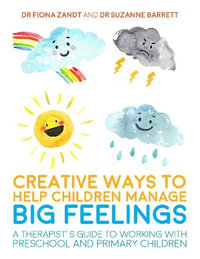
Creative Ways to Help Children Manage BIG Feelings
A Therapist's Guide to Working with Preschool and Primary Children
Paperback
RRP $66.99
$57.50
OFF
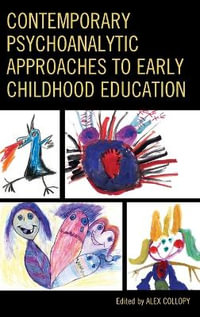
Contemporary Psychoanalytic Approaches to Early Childhood Education
Critical Childhood & Youth Studies: Theoretical Explorations
Hardcover
RRP $207.00
$161.40
OFF
This product is categorised by
- Non-FictionFamily & HealthParenting: Advice & IssuesPregnancy, Birth & Baby Care
- Non-FictionMedicinePre-Clinical Medicine & Basic SciencesHuman Reproduction, Growth & Development
- Non-FictionPsychologyChild & Developmental Psychology
- Non-FictionFamily & HealthRelationships & Families: Advice & Issues
- Non-FictionSociety & CultureSocial Groups
- Non-FictionSociology & AnthropologyAnthropology
- Non-FictionScienceBiology, Life SciencesLife Sciences in GeneralEvolution

